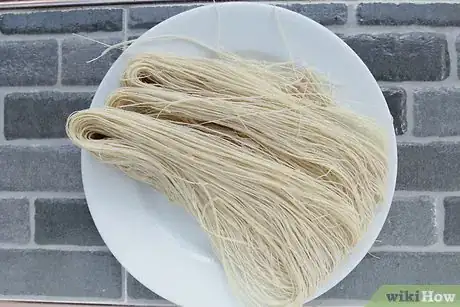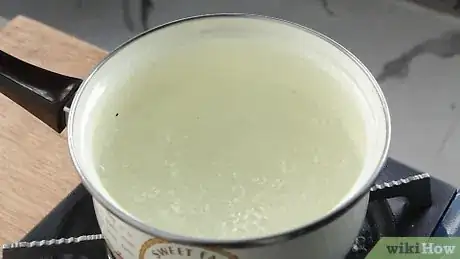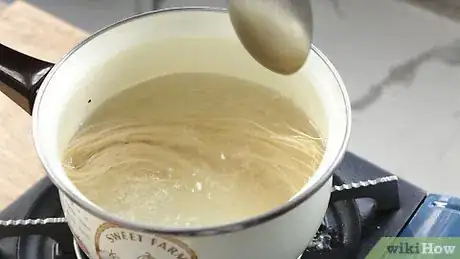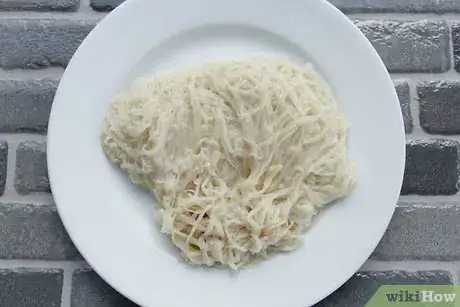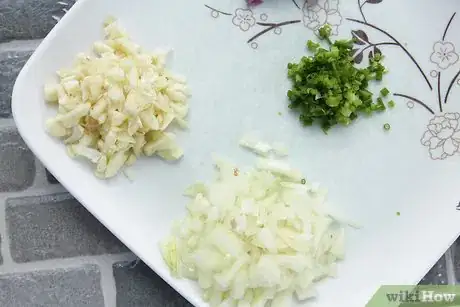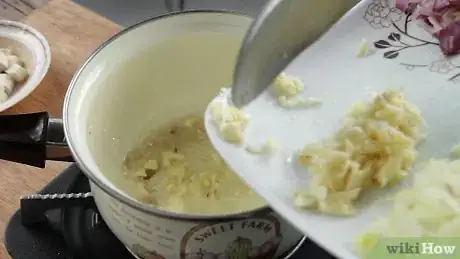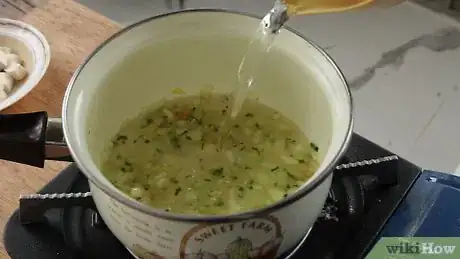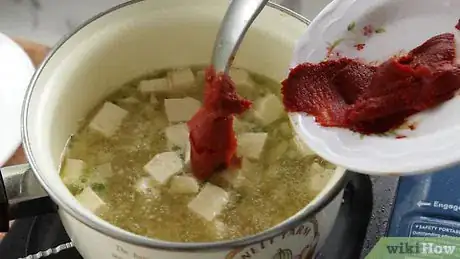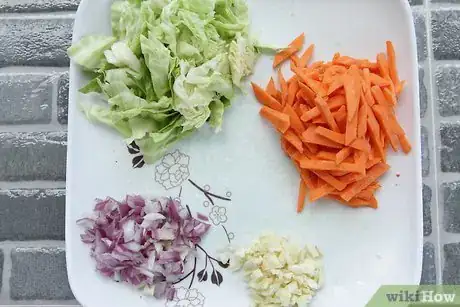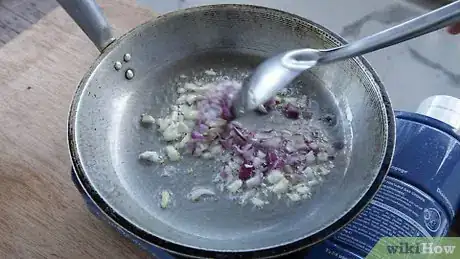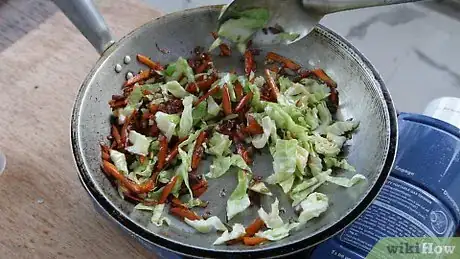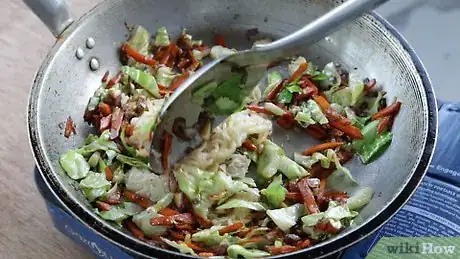This article was co-authored by wikiHow Staff. Our trained team of editors and researchers validate articles for accuracy and comprehensiveness. wikiHow's Content Management Team carefully monitors the work from our editorial staff to ensure that each article is backed by trusted research and meets our high quality standards.
There are 10 references cited in this article, which can be found at the bottom of the page.
This article has been viewed 23,145 times.
Learn more...
Misua noodles are thin, salted noodles popular in both Chinese and Filipino cuisine. Depending on your tastes, you can prepare these noodles in one of several different ways. Boiling misua, cooking misua soup, or frying misua are all popular ways to prepare these noodles. Once you've cooked your misua, you'll have prepared a delicious and traditional Asian noodle dish.
Ingredients
- 2 ounces (57 g) of boiled misua noodles
- 4 fl oz (120 mL) can of tomato paste
- 1 bunch of green onions
- 6 garlic cloves
- 1 medium yellow onion
- 6 tablespoons (89 mL) of vegetable oil
- 6 cups (1.4 L) of water
- Meat, fish, or tofu (optional)
- Salt and pepper to taste
Makes two servings.
- 4 ounces (110 g) of fresh or boiled misua noodles
- 3 garlic cloves
- 1⁄4 cup (0.059 L) of shiitake mushrooms
- 3 tablespoons (44 mL) of vegetable oil
- 1/2 medium yellow onion
- 3-4 medium sized carrots
- 2 tablespoons (30 mL) of soy sauce
- Salt and pepper to taste
- 1⁄4 cup (0.059 L) of peanuts
- 1 green onion
Makes two servings.
Steps
Boiling Misua Noodles
-
1Purchase your misua noodles fresh or dry. Depending on whether you want to boil the noodles, you can purchase them dry or already cooked. Fresh noodles are already cooked, whereas dry noodles will need to be boiled before serving.[1]
- If the shop does not sell misua noodles, you can use Japanese somen noodles as a replacement.
- Fresh misua noodles do not need to be boiled and generally have an expiration date of several days or weeks after purchase. You can add them unboiled to most dishes.
-
2Bring a large pot of water to boil. Fill a pot halfway with water over the sink, and place it on your stove top. Turn the stove to high heat until it comes to a boil, then lower the temperature to medium heat.[2]
- Bringing the water to boil should take between 10-15 minutes.
Advertisement -
3Boil the misua noodles for 2-3 minutes. Once the water is boiling, drop the misua noodles in the water. Leave them in the pot to boil for about 2-3 minutes for a soft, yet firm texture.[3]
- The noodles should be fully submerged in the water.
- Because misua is more fragile than most Asian noodles, drop it into the pot gently.
-
4Remove the misua noodles before they become too soft. After 2-3 minutes have passed, turn off the heat and remove the pot from the water. Drain the misua noodles over the sink and place the cooked noodles in a bowl.[4]
- From here, you can serve the misua noodles or use them in soups or fried dishes. You can also serve them as they are with teriyaki or soy sauce, if desired.
- If you have leftovers after serving the noodles, place them in an airtight container and store them in your fridge for up to 3-5 days.[5]
Cooking Misua Soup
-
1
-
2Saute the garlic and onions over medium heat for 4-5 minutes. Add the minced vegetables to a large pot along with 3 tablespoons (44 mL) of vegetable oil, and place it on your stove at medium heat. Fry the minced vegetables, stirring the pot continuously, for 4-5 minutes.[7]
- After sauteing the minced vegetables, you should notice a fragrant aroma and a more translucent color.
-
3Add 6 cups (1.4 L) of water and protein, if desired, and bring it to a boil. Pour in the water as well as a meat or protein into the pot—pork meatballs, canned sardines, and tofu are all traditional choices. Let the water simmer over the pan for 10-15 minutes until the pot begins to boil.[8]
- If you would prefer not to add protein, you can just add the water instead.
- How much protein you add depends on your personal preferences. You can add as much or as little as you need.
-
4Pour in the can of tomato paste and let the mixture simmer for 10-15 minutes. Add the 4 fl oz (120 mL) can of tomato paste to the pan and turn the stove to low heat. Let the mixture simmer over low heat, stirring the vegetables and protein continuously.[9]
-
5Add the pre-boiled misua noodles and simmer for 2 more minutes. Pour the boiled misua noodles into the pot and stir them into the soup. Let the noodles simmer for 2 minutes, then turn off the heat and serve the soup as desired.[10]
- Use a ladle to pour the misua soup into bowls and serve immediately.
- You can store misua soup by placing them in an airtight container and leaving it in the fridge for 3-4 days or in the freezer for 2-3 months.[11]
Making Fried Misua Noodles
-
1Chop the carrots, mushrooms, cabbages, garlic, and onions. Lay the vegetables on a cutting board one at a time and cut them into thin vertical strips. Place the vegetable slices in separate bowls, and set them aside for later.[12]
- The vegetable slices should be thin so they can fry quickly. If you notice any especially long or thick pieces, cut them in half to ensue that they fry evenly.
-
2Fry the garlic and yellow onions over the stove for 5-10 minutes. Add the chopped garlic and onion to a frying pan along with 3 tablespoons (44 mL) of vegetable oil. Stir the garlic and onions over medium heat until you notice a translucent color and fragrant smell, or 5-10 minutes.[13]
- Do not put the green onion into the pan, as you will use it later as a garnish.
-
3Add the mushrooms, carrots, cabbage, and soy sauce and fry for 5-10 minutes. After frying the garlic and onions, pour the remaining vegetables (except for the green onion) one at a time into the pan along with 2 tablespoons (30 mL) of soy sauce. Stir all of the vegetables in the pan for another 5-10 minutes continuously to help them fry evenly.[14]
- For a non-vegetarian dish, you can also add cooked beef, pork, or shrimp to along with the vegetables. How much you add depends on your preferences, as you can add as much or as little as you want.
-
4Add the boiled noodles, and let the pot simmer for 10-15 minutes. Pour the boiled misua noodles into the pot and stir continuously. Then, turn the stove to low heat and let the vegetables and noodles simmer for 10-15 minutes.[15]
-
5Pour the noodles into a bowl and garnish with green onions and peanuts. After 10-15 minutes, remove the pan from the heat and pour its contents into the bowl. Top the fried noodles with the peanuts and chopped green onions and serve immediately.[16]
- Add salt and pepper to taste, as desired.
- You can store fried misua noodles in the fridge for 3-5 days or in the freezer for 1-2 months after placing them in an airtight container.[17]
Things You'll Need
Boiling Misua Noodles
- Water
- Pot
Cooking Misua Soup
- Pot
- Water
- Stirring spoon
Making Fried Misua Noodles
- Bowls
- Frying pan
- Stirring spoon
References
- ↑ https://www.rotinrice.com/mee-suah-soup/
- ↑ http://www.recipetips.com/kitchen-tips/t--555/asian-noodles.asp
- ↑ http://www.recipetips.com/kitchen-tips/t--555/asian-noodles.asp
- ↑ https://www.rotinrice.com/mee-suah-soup/
- ↑ https://www.stilltasty.com/fooditems/index/17887
- ↑ https://panlasangpinoy.com/2015/05/06/misua-and-meatball-soup/
- ↑ http://authenticfilipinorecipes.com/recipe/sardines-with-misua-recipe/
- ↑ http://authenticfilipinorecipes.com/recipe/sardines-with-misua-recipe/
- ↑ https://kitchenconfidante.com/filipino-meatball-noodle-soup-misua-bola-bola-recipe
- ↑ http://authenticfilipinorecipes.com/recipe/sardines-with-misua-recipe/
- ↑ https://www.foodsafety.gov/keep/charts/storagetimes.html
- ↑ https://www.nofrillsrecipes.com/2015/01/stir-fry-misua.html
- ↑ https://www.nofrillsrecipes.com/2015/01/stir-fry-misua.html
- ↑ http://www.obsessivecooking.com/2015/02/fried-chinese-birthday-noodles-tsa-misua.html
- ↑ https://www.nofrillsrecipes.com/2015/01/stir-fry-misua.html
- ↑ http://www.obsessivecooking.com/2015/02/fried-chinese-birthday-noodles-tsa-misua.html
- ↑ http://www.stilltasty.com/fooditems/index/17887
About This Article
To cook dry misua noodles, start by bringing a large pot of water to a boil. When the water’s simmering, carefully drop the noodles in and cook them for 2-3 minutes or until they’re soft but firm. Once they’re cooked, serve them with teriyaki or soy sauce. You can also add them to a soup with tomato paste, vegetables, and meat, fish or tofu. Alternatively, fry your misua noodles with mushrooms, vegetables, soy sauce, and peanuts. For more tips, including how to make soup and stir fry with misua noodles, read on!
